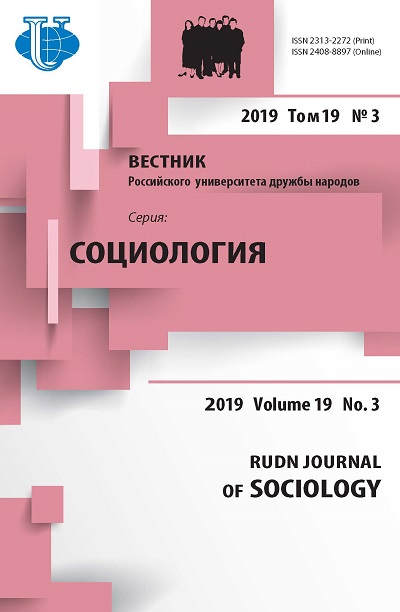Эссе о неолиберализме
- Авторы: Шабага А.В.1
-
Учреждения:
- Российский университет дружбы народов
- Выпуск: Том 19, № 3 (2019)
- Страницы: 553-562
- Раздел: Рецензии и эссе
- URL: https://journals.rudn.ru/sociology/article/view/21688
- DOI: https://doi.org/10.22363/2313-2272-2019-19-3-553-562
- ID: 21688
Цитировать
Полный текст
Аннотация
Сравнение либерализма и неолиберализма показывает, что концептуальные противоречия либеральных идей возникают при гипостазировании разных форм социального бытия, поэтому политический либерализм будет так или иначе противоречить культурному либерализму, а правовой рано или поздно войдет в конфликт с экономическим. Что касается принципиальных расхождений между концепциями либерализма и неолиберализма, то они не обнаруживаются: и либерализм, и неолиберализм основываются на одних и тех же ценностях, и различия заключаются лишь в сфере их приложения. Либерализм как политическая практика предназначен в основном для внутреннего потребления, неолиберализм - для внешнего. Иными словами, неолиберализм, являясь составной частью либерализма, представляет собой внешнеполитическое измерение либеральных концептов. Внешней политике имманентно присуща агрессия: предтечами современных неолибералов следует признать ряд французских революционных правительств. В качестве доказательства укажем на внешнюю политику Конвента, которая явно переросла либеральные идеи Просвещения и была направлена на силовую реализацию либерализма в масштабе Европы. Суть либерализма проявляется в вытеснении прежних, отчасти еще традиционных социальных, политических и хозяйственных практик и замещении их унифицированными, которые должны стать нормой для всего человечества. Что касается неолибералов, то они предпочитают продвигать свое влияние посредством институционального давления, используя международные неправительственные организации, транснациональные компании, а также связанные с ними руководства ряда стран разного уровня развития. Эти организации, набирая кадры для менеджмента по всему миру и постоянно их перетасовывая, перемещая их из страны в страну, пытаются создать новую управленческую культуру, предназначенную для неолиберальной модели управления, ориентированной на глобальный масштаб. Цель неолибералов по большому счету неотличима от целей либералов (можно спорить только о средствах) и представляет ее внешнеполитическую компоненту: она заключается в переформатировании социального пространства в глобальном масштабе. Внешне это выглядит как упразднение прежних государств и введение новой социально-политической системы, что можно увидеть в Евросоюзе, где прежние государства постепенно замещаются регионами и проводится социальная политика, направленная на формирование новоевропейской идентичности.
Об авторах
Андрей Владимирович Шабага
Российский университет дружбы народов
Автор, ответственный за переписку.
Email: schabaga@gmail.com
доктор философских наук, профессор кафедры теории и истории международных отношений Российского университета дружбы народов
ул. Миклухо-Маклая, 6, Москва, 117198, РоссияСписок литературы
- Бодрийяр Ж. Фатальные стратегии. М., 2017.
- Гегель Г.В.Ф. Философия права. М., 1990.
- Гоббс Т. О гражданине // Сочинения в 2-х тт. Т. 1. М., 1989.
- Гюго В. Речь при открытии конгресса 21 августа 1849 года // Гюго В. Собрание сочинений в 15-ти тт. Т. 15. М., 1956.
- Дёринг Д. Либерализм: размышление о свободе. М., 2001.
- Кьеркегор С. Или-или. Фрагмент из жизни. СПб., 2011.
- Ойкен В. Основные принципы экономической политики. М., 1995.
- Хайек фон Ф. Дорога к рабству. М., 2010.
- Godwin W. Enquiry Concerning Political Justice, and Its Influence on General Virtue and Happiness. L., 1793.
- Diogenes Laertius. Vitae philosophorum.
- Halévy É. Imperialism and the Rise of Labour. N.Y., 1951.
- Köhler W. Crash 2009 - Die neue Weltwirtschaftskrise. Murnau am Staffelsee, 2009.
- Mirowski P., Plehwe D. The Road from Mont Pelerin: The Making of the Neoliberal Thought Collective. Harvard, 2009.
- Moravcsik A. The Golden Moment // Newsweek. March 26, 2007.
- [15] Plato. Res publica.
- Rodbertus K. Zur Beleuchtung der socialen Frage. B., 1875.
- Thomas Aquinas. Sancti Thomae de Aquino Summa Theologiae.
- Turner R.S. Neo-Liberal Ideology: History, Concepts and Policies. Edinburgh, 2008.
- Vargas Llosa M. Liberalism in the new millennium // Global Fortune: The Stumble and Rise of World Capitalism. Washington, 2000.
Дополнительные файлы













